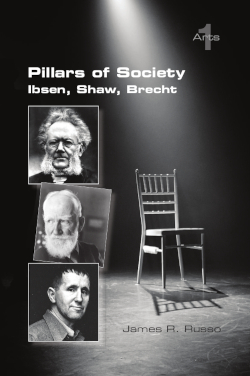 | Pillars of Society
Ibsen, Brecht, Shaw
James R. Russo
Pillars of Society: Ibsen, Brecht, Shaw is a collection of essays on the plays Pillars of Society (1877), Ghosts (1881), A Dolls House (1879), and Hedda Gabler (1890), by Henrik Ibsen; The Philanderer (1893), Candida (1894), The Doctor’s Dilemma (1906), Androcles and the Lion (1912), Major Barbara (1905), Misalliance (1910), Saint Joan (1923), and Pygmalion (1913), by George Bernard Shaw; A Man’s a Man (1926), Mother Courage and Her Children (1941), The Caucasian Chalk Circle (1945), Life of Galileo (1939), Saint Joan of the Stockyards (1929), The Trial of Joan of Arc at Rouen, 1431 (1934), and The Visions of Simone Machard (1943), by Bertolt Brecht; and on the subjects of tragedy, comedy, realism, theatricalism, feminism, and adaptation.<
><
>Pillars of Society thus features close analysis of individual plays by Ibsen, Shaw, and Brecht, plus readable, comparative surveys of these writers’ dramatic oeuvres and production careers. Shaw wrote about Ibsen’s incipient influence on him in The Quintessence of Ibsenism; early in his career, Brecht wrote an essay about Shaw titled “Three Cheers for Shaw.” These three modern dramatists are linked, in this way, in their common moral, social, and political concerns, as well as in their
idging of such artistic movements as naturalism, symbolism, epic theater, even absurdism.<
><
>James R. Russo is an independent researcher who holds graduate degrees, including the doctorate, from the University of Richmond and Louisiana State University. He has taught at those schools as well as Tulane. Russo’s primary scholarly interests are the cinema and comparative literature. He has edited or authored the following published books: Film Nation: William Troy on the Cinema, 1933-1935; The Bookman: William Troy on Literature and Criticism, 1927-1950; Drama According to Alexander Bakshy, 1916-1946; and Analyzing Film: A Student Casebook.
978-1-84890-404-0
Buy from Amazon: UK US
|

